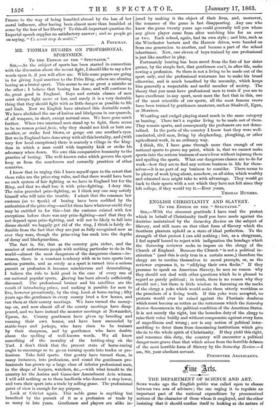ENGLISH CHRISTIANITY AND SLAVERY. To THE EDITOR OF THE "SPECTATOR."
SIR,—With the sincerest gratitude I have read the protest which in behalf of Christianity itself you have made against the doctrine maintained by the Saturday Review on the subject of Slavery, and still more on that vilest form of Slavery which the Southern planters uphold as a state of ideal perfection. To the strength of that protest I can add nothing ; but, as a clergyman, I feel myself bound to reject with indignation the bondage which the Saturday reviewer seeks to impose on the clergy of the Church of England. Because the Church "is not a political in- stitution" (and this is only true in a certain sense,) therefore the clergy are to confine themselves to moral precepts, or, as the reviewer expresses it, to "edifying their own flocks." If they presume to speak on American Slavery, he sees no reason why they should not deal with other questions which he is pleased to regard as purely political ; in truth, there is no reason why they should not ; but there is little wisdom in fastening on the necks of the clergy a yoke which would make them utterly worthless as the preachers of a living truth. If this yoke were accepted, no protests would ever be raised against the Pharisaic deadness which must become as rotten as the rottenness which the Saturday Review denounces in the political condition of the American States. It is not merely the right, but the bounden duty of the clergy to raise their voice boldly and without compromise against every form of ungodliness and wrong ; nor is any notion of political inter- meddling to deter them from denouncing institutions which give the fie to the whole spirit of Christianity. If they yield this right, and renounce this duty, the country will encounter a political danger more grave than that which arises from the horrible defence of the most horrible form of Slavery by the Saturday Review.-1 am, Sir, your obedient servant.
PltESBYTER ANGLICANUS.






























 Previous page
Previous page